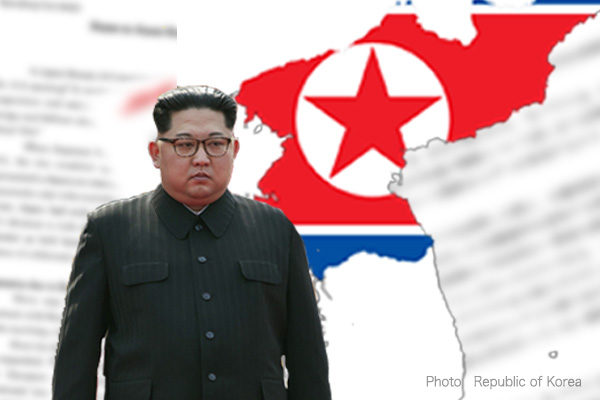A major policy shift is taking place in Pyongyang. South Korea is not part of the same nation to be reunified, but an enemy country to be conquered by war, according to North Korean leader Kim Jong Un’s speeches at a plenary session of the Central Committee of the Workers’ Party of Korea late last year and at the Supreme People’s Assembly on January 15 this year.
What was particularly surprising was that Kim reviled the Monument to the Three Charters for National Reunification as “eyesore” and ordered its complete removal in his January 15 speech, before it was actually removed a few days later. The three charters are the Three Principles of National Unification (1972), the proposal for founding the Democratic Federal Republic of Koryo (1980), and the 10-Point Program of the Great Unity of the Whole Nation for the Reunification of the Country (1993), all of which were advocated by North Korea founder Kim Il Sung. The giant arch-shaped monument to commemorate the three charters was erected by his successor and son Kim Jong Il in 2001 at the entrance of a road leading from Pyongyang to South Korea. Right next to the arch stood a large stone engraved with the words of Kim Il Sung.
The symbolic monument has been removed. I heard that Pyongyang citizens were whispering that Kim Jong Un lost his sense of normalcy by renouncing his two predecessors. Pro-Pyongyang leftists in South Korea have also been shaken tremendously. Lee Jae Myung, the leader of the main opposition Democratic Party of Korea, even advised Kim Jong Un to take care not to damage the efforts of his two predecessors.
North Korean military action is unlikely
What the hell is going on? I already wrote in this column on September 4 last year that “ the Kim Jong Un regime may have an increasing fear that the South could absorb and unify the North.” A longing for the South is spreading not only in Pyongyang but also in provincial cities and rural areas, with South Korean dramas having been all the rage. The authorities’ repeated crackdown has failed to stop the longing. The reason for the Pyongyang policy shift is that Kim Jong Un fears that if left unchecked, people’s desire for absorption and unification into the South could be maximized. I believe that his talk of war also reflects his fear about the South and that he will not actually take military action.
Pyongyang’s sense of crisis over the influx of South Korean information can be seen from the enactment of the Act on the Elimination of Reactionary Thought and Culture in December 2020 and the Pyongyang Cultural Language Protection Act in January 2023. According to a political study literature issued in 2022, “In 2021, more than 9,000 junior and senior high school students in a city visited local security offices and confessed that they had seen impure videos (such as South Korean TV dramas), and more than 3,000 of them submitted USBs containing impurities.”
As a result of the discontinuation of rationing since the mid-1990s, North Koreans, who have been doing trade in the market for living without relying on the Workers’ Party, now know about the good life in South Korea and secretly hope for North Korea’s absorption into the South. Driven by the strong sense of crisis, Kim Jong Un was forced to deny the source of his legitimacy, the “bloodline of Mount Paektu.” The end of the third hereditary regime in North Korea has begun.
Defectors’ campaigns have borne fruit
Since former President Kim Dae Jung, the South Korean government has discontinued using shortwave broadcasting, balloon leaflets, and USBs to flow outside information into North Korea. Since then, North Korean defector human rights activists have undertaken such activities. Furthermore, more than 30,000 North Korean defectors living in South Korea have sent money, even if they are poor, to their families in the North. As the result, the longing for the families of defectors has increased in the North, and young women are said to have come to want to marry into defector families rather than members of the Workers’ Party. The desperate efforts of North Korean defectors have finally changed North Korea in a big way.
Tsutomu Nishioka is a senior fellow and a Planning Committee member at the Japan Institute for National Fundamentals and a specially-appointed professor at Reitaku University. He covers South and North Koreas.


